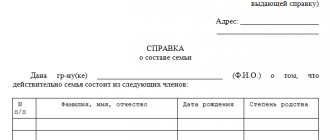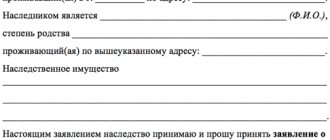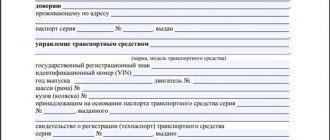Entry into inheritance
To obtain the full range of legal rights to real estate, it must be officially accepted by using the services of a notary. This is a fairly simple procedure in situations where no legal conflicts arise. But sometimes lawyers have to deal with very serious and complex disputes.
The heir must declare his intention to accept the property due to him and register a private house as property by inheritance within six months from the date of death of the previous owner, since after this time the right to inheritance is lost and it is transferred either in favor of other heirs or in favor of states.
The missed deadline for entering into an inheritance can be restored only in court and only if the reasons are objective and valid.
List of documents
The list of papers that may be needed to register an inheritance varies depending on the circumstances of each specific case. However, the law also defines the mandatory documents required to inherit a house:
- Death certificate of the testator.
- Documents confirming the former owner's ownership of the property.
- An extract from the testator’s place of residence containing information about who lived with him.
- Heir's identity card.
If inheritance is carried out according to law, you need to provide the notary with papers confirming the existence of family ties with the deceased.
If the basis for receiving property is a will or inheritance agreement, then the corresponding document must be presented.
In situations where the heir decides to contact a notary through an intermediary, the latter will need to draw up and then transfer to the lawyer a power of attorney to represent the interests of this person.
What documents are needed to register a house as an inheritance after death?
The procedure for registering a house as an inheritance after death involves the need to develop and submit a huge number of documents. The contents of the package of papers differ depending on the specific circumstances. Let's consider some situations.
- The applicant must submit to the notary firm an application addressed to the notary, documents from the Housing Office about the last place of residence, the death certificate of the testator, information about marriage registration, documents for children, the applicant’s passport, papers for the inherited house, an appraisal report for land and real estate. The notary reviews the documentation and, if everything is in order, issues a certificate of inheritance within six months;
- After the notary issues a certificate of inheritance, the citizen needs to register the object in his name. You need to submit to the MFC a copy of your passport, a copy of a certificate from a notary, documentation for the property, and a receipt for the state duty.
If a citizen has missed the deadline for entering into an inheritance and is trying to defend his rights in court, then he will need the help of a lawyer in drawing up procedural documents: statement of claim, petitions, requests, claims, etc.
Inheritance of land
The main thing you need to know is that a house and a plot of land are inherited and, accordingly, inherited as two independent objects. Moreover, both the house and the land can become objects of shared ownership.
Automatically, only that plot of land that is required for the use and maintenance of the building is transferred with the house. Rights to the remaining acres will need to be registered separately.
You can learn about the legal nuances associated with inheriting land from the article “Inheritance of a land plot.”
Algorithm for registering property after inheritance
The certificate received from a notary does not give the right to property, but is only a document on the basis of which you can formalize the object into unconditional possession and disposal at your own discretion, including alienation and other legally significant actions. To register a house as an inheritance, you must go through the registration procedure with Rosreestr.
The procedure for registering a house as an inheritance and a land plot
The final stage confirming the ownership of the building or land is obtaining a new extract from the Unified State Register of Real Estate, where the name of the heir is listed among the owners. In this case, registration of inheritance for a house and a land plot is carried out separately, followed by the issuance of a registration document for each object separately.
The procedure includes the following steps:
- submitting an application with a package of documentary applications to Rosreestr directly, through the MFC or State Services;
- receipt of a legal document - an extract from the Unified State Register of Real Estate (USRN) within the prescribed period.
The time frame for issuing an extract ranges from 5 to 12 days, depending on the authority where the documentation is sent.
Application and attached documents
The submitted standard form application is accompanied by documents depending on the inherited object, including:
- certificate of inheritance for the building and adjacent land, and if there are different heirs or shared ownership, when inheriting by law, documents are submitted separately by each of the co-heirs;
- a general passport confirming the identity of the heir;
- technical documentation for real estate;
- receipt for payment of state duty.
After checking the documentation package, the applicant is given a receipt from the responsible employee, which indicates the date of receipt of a new title document, which puts an end to the registration of inheritance for the land and house.
Material costs
The registration procedure is subject to a state fee, but the amount is determined by the property. The payment to the budget is:
- Registration of inheritance for a house – 2000 rubles.
- Registration of land as an inheritance by will or by law depends on the intended purpose and amounts to:
- for an allotment for dacha farming and agricultural land – 350 rubles;
- for part of the common shared property - 100 rubles;
- for registration of rights under the terms of an easement – 1,500 rubles.
Entering into inheritance without documents
Situations are quite common when title documents for real estate are lost over time. Therefore, after the death of the last owner, his potential heirs have the question of how to enter into an inheritance if there are no documents for the house and/or land.
In these cases, the law provides two possible solutions to the problem. First: try to find data on the registration of ownership of real estate and land. The direction of the search will depend on exactly when the property was acquired by the former owner, since the rules for registering real estate were changed in 1997.
If you cannot find the loss, you should use the second option. That is, apply to the court with a petition to recognize the former owner of the rights to real estate.
To prove the inheritance of a house without title documents, you will have to provide evidence of actual ownership of the property: utility bills, tax bills, garden books, testimony of neighbors, etc.
For a residential property registered before 1997
After amendments to the legislation adopted in 1997, a new principle for registering real estate objects came into force on January 31, 1998. Before this, there were no uniform registration rules and this task was carried out, depending on the regulations in force in each individual region of the country, by a variety of organizations.
Therefore, it is worth looking for documents for the house in the district archive, district administration, BTI, notary office or the Office of the Federal Service for State Registration, Cadastre and Cartography. Information about land registration can also be found in the local authority, which was responsible for the state cadastral registration of land plots until 1998.
All documents that were issued before 1998 are still valid today. But if you wish, you can exchange them for documents of a new sample.
Preparation of documents for the house and share
A house located on a plot of land is inherited as two separate objects.
Moreover, they both require mandatory state registration of ownership rights to them. State registration must begin when a certificate of inheritance is received.
This certificate is issued by a notary after the opening of an inheritance case at the request of the successor. In this case, the successor can already live in this house and pay various associated expenses, which will mean actual acceptance of the inherited property.
Registration of inheritance
Registration of the right to inherited property is a procedure confirming the desire of a citizen to accept the inheritance due to him. As already noted, this event is regulated by deadlines and requires the participation of a notary.
Process steps
In short, registration of inheritance consists of three stages:
- Applying to a notary with an application to open an inheritance case.
- Collection and submission to the notary's office of all documents required in your case.
- Obtaining a certificate of inheritance.
The registration of inheritance for the house and land is completed by registering the ownership of the property with the body authorized to carry out these procedures at the location of the property.
This step is not mandatory, but only it will allow you to gain full control over the house and land, as well as the ability to freely dispose of these material goods.
Required documents
In the section that discussed accepting an inheritance, we already talked about what documents are needed to register an inheritance for a house and land. In addition to these, you may also need:
- Technical passport for construction.
- A certificate confirming that the former owner has no debts on this property (for example, on utility bills).
- Conclusion of an appraisal company on the value of real estate at the time of death of the testator, etc.
The notary will provide you with a more complete and accurate list of documents after the first consultation.
Read more about the process of entering into inheritance rights and the nuances of collecting documents in the material “How to register an inheritance.”
What are the methods for registering a house as an inheritance after death?
In order to correctly register a house as an inheritance after death, you need to have an idea of what methods of carrying out the procedure exist. The legislation of the Russian Federation allows applicants to use one of two possible options.
Registration of a house as an inheritance after death through a notary office
Before going to a notary firm, the applicant must remove the deceased relative from registration at the place of residence. Then you should contact a notary with an application filled out in a special form and the documents attached to it. It is important to do this no later than six months after the death of a relative, otherwise the notary may refuse to register the house.
Registration of a house after the death of a relative through the courts
This option is the only opportunity for an inheritance applicant to formalize ownership of real estate if there are other potential heirs with whom a dispute has arisen, or if he has not submitted an application to the notary’s office in a timely manner.
It is also of great importance whether the testator left a will. Whatever method of registering a house as an inheritance after the death of a loved one is chosen, you should carefully consider such points as the procedure and preparation of documents. Below we will consider these issues in more detail.
How to properly register a house as property by inheritance
Application form for acceptance of inheritance and issuance of a certificate
The process of inheriting a house consists of three very important steps:
- The first stage includes submitting an application and all necessary documentation to the notary opening the inheritance case. This must be done no later than six months from the date of death of the testator. After accepting the documents, the notary has the right to issue a certificate confirming the opening of the inheritance case;
- The second stage is to obtain a certificate of inheritance. After six months, the heir must contact a notary for this document;
- The final stage includes submitting a package of documents to state registration authorities to obtain a certificate of ownership of the house.
The registration process itself can be complicated, for example, by the presence of several applicants for the property.
Even in the case where only one heir is indicated in the will, others also have the right to a share in this property.
In order to speed up and simplify the procedure, it is best to contact a lawyer who will provide qualified assistance to the heir and represent his interests in the conduct of this inheritance matter.









